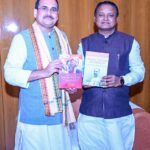India Caught Between Its Remakers and Breakers
- By : Anirban Ganguly
- Category : Articles
It was not surprising to see a bunch of Communist leaders rush to support and speak in favour of a group of students in the Jawaharlal Nehru University, who sloganeered and took out processions
advocating secessionism and separatism in India, and the overall destruction of India herself. It was a day of mourning, the day Members of Parliament such as Sitaram Yechury, D Raja and Rahul Gandhi rushed to defend students who were eulogising a terrorist who had actively carried out an attack on Parliament in 2001.
The Congress has not adequately answered the question repeatedly posed by BJP president Amit Shah as to how their vice-president could wade into and express solidarity with a movement whose core objective is to promote the vivisection of India. Nor has comrade D Raja explained to the nation how his daughter came to be part of this group of sloganeers who were demanding freedom for Kashmir through the power and force of the gun.
Subterfuge has always been the standard policy for Communists in India. Ever since Independence, they have desperately tried to wrack apart the fabric of India through conflict and subversion. Even in their participation in the parliamentary system, the objective of the Communists has been to try and wreck the system from within. While one chunk of their co-partners, the ultra-Leftists—represented by Maoists and Naxals—continue to advocate armed struggle against India, the Communists continue to try and side with forces and elements that are inimical to India’s national interest and seek to destabilise and break her apart.
The combination of urban and rural Naxalism and Maoism, and their coalition with jihadist and Communists is indeed a nefarious network which is seeking to continuously hack at the civilisational idea of India. For them, multiplicity, freedom, free thought and democracy are just claptraps to be used and discarded in order to bring about their “liberated zones”. The recent episode in the prestigious JNU is the expressions of that alliance. The larger struggle is the preservation of the actual civilisational idea of India from these intellectual marauders of a false ideology.
Much is also being talked about nationalism these days. A certain MP from West Bengal quoted Sri Aurobindo out of context, trying to articulate his views on nationalism, which, however, is de rigueur these days. One would do well, instead, to look at Sri Aurobindo’s articulation of a new vision of nationalism when he wrote that it “overleaps every barrier; it calls to the clerk at his counter, the trader in his shop, the peasant at his plough; it summons the Brahmin from his temple and takes the Chandala in his degradation; it seeks out the student in his college, the schoolboy at his books, it touches the very child in its mother’s arms; and the secluded zenana has thrilled to its voice; its eye searches the jungle for the Santal and travels the hills for the wild tribes of the mountains… It cries to all to come forth, to help in God’s work and remake a nation, each with what his creed or his culture, his strength, his manhood or his genius can give to the new nationality. The only qualification it asks for is a body made in the womb of an Indian mother, a heart that can feel for India, a brain that can think and plan her greatness, a tongue that can adore her name or hands that can fight in her quarrel”.

















